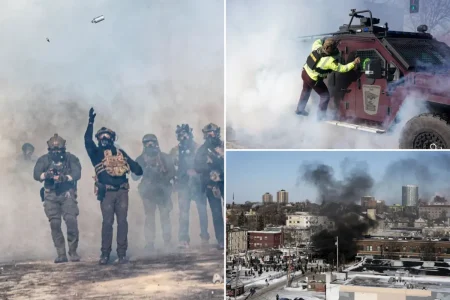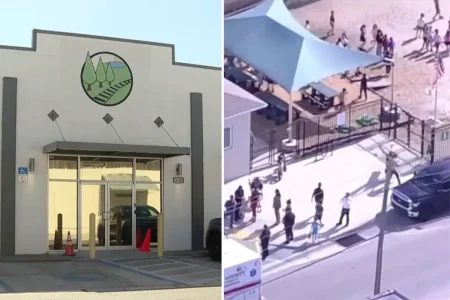Humanitarian Aid Mission Thwarted: Israeli Forces Intercept Gaza-Bound Flotilla
International Incident Unfolds as Aid Vessels Blocked from Reaching Crisis Zone
In a tense maritime confrontation that has drawn international attention, Israeli naval forces have intercepted several vessels attempting to deliver humanitarian supplies to the Gaza Strip, according to statements from both activist organizations and Israel’s Ministry of Foreign Affairs. The boats, part of the Global Sumud Flotilla initiative, were stopped in international waters as they approached the blockaded Palestinian territory, marking the latest chapter in the ongoing humanitarian crisis affecting the region’s 2.3 million residents.
The interception occurred approximately 85 nautical miles from Gaza’s coastline, where Israeli naval vessels surrounded the flotilla before boarding and redirecting the ships to Israeli ports, according to eyewitness accounts shared through satellite communications before contact was lost. The Global Sumud Coalition, which organized the mission, stated that the vessels were carrying essential medical supplies, nutritional aid, and water purification equipment—critical resources in a territory where the United Nations has documented severe shortages following months of conflict and restricted access to humanitarian assistance.
“These vessels represented a lifeline for civilians caught in an unprecedented humanitarian emergency,” said Dr. Maryam Hassan, an international aid coordinator familiar with the mission but not directly involved in the flotilla. “The interception raises significant questions about proportionality and access to humanitarian relief under international law.” Israel’s Foreign Ministry defended the action, stating that the naval blockade remains a necessary security measure to prevent weapons and other prohibited materials from reaching militant groups in Gaza. Ministry spokesperson Eli Cohen emphasized that “approved humanitarian aid continues to enter Gaza through designated land crossings following appropriate security protocols,” though international organizations have consistently reported that these channels provide insufficient relief given the scale of need.
Historical Context and Legal Implications Shape Maritime Standoff
This incident echoes previous maritime confrontations, most notably the 2010 Mavi Marmara incident in which nine Turkish activists were killed when Israeli forces boarded a vessel attempting to breach the blockade. That event triggered a diplomatic crisis between Israel and Turkey and drew widespread international condemnation. The legal framework surrounding Gaza’s maritime access remains contested, with Israel maintaining that its blockade is legal under international law as a security measure, while human rights organizations argue that the comprehensive nature of the restrictions constitutes collective punishment of the civilian population.
The Global Sumud Flotilla—”sumud” being an Arabic term signifying steadfastness or resilience—represents a coalition of humanitarian organizations from twelve countries who coordinated the mission over several months. Participating vessels reportedly departed from ports in Turkey, Greece, and Cyprus, with international volunteers including medical professionals, human rights observers, and former diplomats aboard. Communication with the vessels was severely limited following the interception, though satellite phone messages indicated that passengers were being detained for questioning upon arrival in Israel.
International reaction to the interception has been swift and divided along familiar geopolitical lines. The United Nations Secretary-General called for “maximum restraint and the prioritization of civilian welfare,” while the European Union’s foreign policy chief expressed “serious concern about the humanitarian situation in Gaza” and urged “all parties to facilitate unimpeded delivery of assistance.” The United States State Department acknowledged Israel’s security concerns while emphasizing the importance of humanitarian access, stating that American officials are “engaged with Israeli counterparts to ensure the well-being of those detained and to facilitate appropriate humanitarian deliveries through established channels.”
Humanitarian Crisis Deepens as Aid Access Remains Restricted
The interception comes amid deteriorating conditions in Gaza, where international agencies report critical shortages of food, medicine, clean water, and fuel. The World Health Organization recently classified the territory’s healthcare system as “on the verge of collapse,” with only 14 of 36 hospitals partially operational and chronic shortages of essential medications. Nutrition experts have documented alarming rates of malnutrition among children, while water treatment facilities operate at minimal capacity due to fuel shortages and infrastructure damage.
“What makes this flotilla different from previous attempts is the severity of the humanitarian situation it was addressing,” explained Professor Jonathan Keller, an expert in international humanitarian law at Cambridge University. “When basic necessities become scarce to this degree, the legal and moral calculations around humanitarian access become increasingly complex.” The Global Sumud Coalition maintains that their mission complied with international humanitarian protocols, including offering to submit to third-party inspection of cargo before proceeding to Gaza—a claim that couldn’t be independently verified as of press time.
The incident has reignited debate about the effectiveness and legitimacy of the blockade policy, which Israel implemented after Hamas took control of Gaza in 2007. Critics argue that the restrictions have devastated Gaza’s economy and civilian infrastructure without achieving their stated security objectives, while supporters maintain that controlling access to the territory remains essential for preventing the flow of weapons and materials that could be used in attacks against Israeli civilians. International humanitarian law recognizes both the right of states to implement security measures and the obligation to allow humanitarian relief for civilian populations, creating tension that has defined the Gaza situation for more than a decade.
Diplomatic Fallout and Legal Challenges Emerge Following Maritime Interception
Legal experts suggest the interception may face challenges in international forums, potentially including the International Court of Justice or specialized UN bodies. “The principle of freedom of navigation in international waters collides here with claims of national security,” noted Dr. Sarah Montague, professor of maritime law at the University of Edinburgh. “The proportionality of the response and the humanitarian imperatives will likely be central to any legal assessment.” Activist organizations have announced plans to file complaints with the United Nations Human Rights Council, arguing that the interception constitutes a violation of the right to humanitarian assistance.
Families of those aboard the vessels have established a coordination center to press for information about their loved ones’ status and treatment. Among those reportedly detained are three physicians, several journalists documenting the mission, and a former UN humanitarian coordinator. Diplomatic representatives from countries whose nationals were aboard the vessels have requested consular access, with varying responses from Israeli authorities. Legal aid organizations have mobilized to provide representation for those detained, though the legal process following such interceptions typically involves deportation rather than extended detention or criminal charges.
As Gaza continues to face what the UN has described as “catastrophic humanitarian conditions,” the interception highlights the complex intersection of security policies, humanitarian imperatives, and international law that has characterized the long-running conflict. With land crossings operating under severe restrictions and the maritime route effectively closed, international organizations continue to advocate for expanded humanitarian access while security considerations remain paramount in Israeli policy calculations. The fate of the Global Sumud Flotilla’s cargo and crew now enters a familiar cycle of diplomatic negotiations, legal challenges, and public advocacy that has defined previous attempts to challenge the maritime restrictions on Gaza.
This maritime confrontation represents not merely an isolated incident but a manifestation of the broader humanitarian dilemma facing Gaza—how to balance legitimate security concerns with the urgent needs of a civilian population caught in prolonged crisis. As international attention focuses briefly on this latest incident, the underlying humanitarian emergency continues unabated, with sustainable solutions remaining as elusive as the horizon the flotilla aimed to reach.







